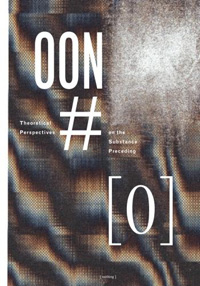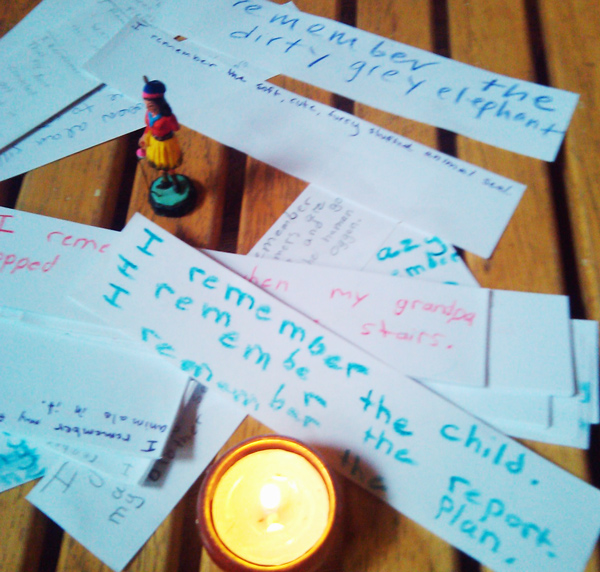OUT OF NOTHING #[0]; Or, blurbing the whole cacophony
 [out of nothing] #0: theoretical perspectives on the substance preceding [nothing]
[out of nothing] #0: theoretical perspectives on the substance preceding [nothing]
Ed. [out of nothing], October 2012
144 pages / $12 Buy from Amazon or Createspace
When the opportunity presented itself to review the printed edition of [out of nothing] recently, I jumped on it quicker than anything I’ve jumped on since I was ten. The idea in my mind wasn’t even necessarily to “review” OON but just to be able to hold the thing in my hands, first and foremost. [out of nothing] and Lies/Isle are obsessions of mine of late—the online versions, that is; these strange permutations of art and thought and science and everything intellectually captivating you could imagine organized into endless mazes of online content. If we’re to believe in such a thing as collaborative arts on the internet, this, in my opinion, is the sort of thing heading up the effort.
So anyway, I immediately requested a review copy of [out of nothing] and when it reached my house I felt connected to something likely akin to movements in the art scenes of New York in the 70s and 80s or Berkeley and various Western lands in the 60s. Here was the personification of serious writing and art in the twenty-first century and here was my opportunity to consider it. To be sure, considering it is likely the greatest feat I’ll here be able to accomplish. I’ve tried over the past few months to conceive of items to potentially submit to a publication like OON and I can’t for the life of me make it happen. Perhaps it has something to do with the collaborative nature of the thing, perhaps the three editors and founders of OON are just that-fucking-savvy that they’ve managed to push the intellectual envelope even more, I’m not sure. All I know is, if The New Yorker was once taken (dreadfully) seriously as a hub to receive one’s culture, [out of nothing] (both the print and online version) is its strange twenty-first century cousin doing bizarre rituals/experiments in the city’s basement trying to reanimate the corpse of Soren Kierkegaard.
But I digress:
Considering the structure of this anthology, I’m going to move through and evaluate each piece in order with as calculated a response as I can muster. This being an anthology of the highest order, my efforts as critic of OON will be best if the responding structure of my own writing not attempt the strange collective genius inherent to that which I’m writing about. I featured the subtitle “blurbing the whole cacophony” to draw comparisons with Melissa Broder’s piece “blurbing every story in the new New York Tyrant,” because it’s helpful to have something to riff off of this time of year, when the mind slows down and wants only to recoil into hours of sleep. O sleep.
(Furthermore, given the array of materials that exists within the 144 pages of OON, the length and style of my interpretations will vary, and where my words will surely fail to illustrate the images/texts and their substance, I’ll include scanned images of pages because I’m not beyond that and I love this fucking thing too much to assume to understand it.)
Now, regarding the introduction:
IS THAT ALL THERE IS?
by Jon Wagner
Reading this, I’m reminded of something Rick Roderick says in his lecture regarding the works of thinkers like Foucault, or Habermas—and one could easily expand this to Deleuze, or even Derrida if one was so inclined—whose works can hardly be called “philosophy,” in the traditional sense. He goes on to emphasize that contemporary “thinkers,” must encapsulate more of society than was previously expected of philosophy, and that the greats like Foucault or Nietzsche must be acknowledged as something else to be understood. Not only can Wagner’s introduction not be called an “introduction,” in the strict understanding of the word, but it belongs alongside the works of those aforementioned thinkers as something transcending mere criticism, philosophy, history, geneology, ontology; the list goes on. What’s given here is first a consideration of the idea of [nothing],’ and what the bracketing of the word/idea itself might mean, then an introduction to the proceeding texts is given and it’s briefly explained that commentary will be provided by a handful of “Jabberwocks,” along the way—“Benjamin, Baudrillard, Derrida, and Kierkegaard. This is something I’ve not seen done, like, ever, and in addition to creating this extremely fun intertextual environment while reading, it brings to mind all kinds of questions about the apocryphal, marginalia in general, and ghosts. My own thoughts here channel and mimic Deleuze, Pasolini, and Miss Peggy Lee within a restricted economy of expression that bleeds a general excess in the very effort of constriction.” I.E. OON does not seek to be a mere anthology, nor even a mere physical book, and will go so far as to resurrect the dead in texts to bury its collective mind in the concepts of nothingness as deeply as possible. This is unlike anything dubbing itself an anthology that I’ve yet experienced, and onward we must go.
PRE-WAR
Nicholas Grider
I’ve wondered a great deal lately about the idea of a text somehow avoiding the idea of a start and finish entirely, and bridging the gap towards something more diffuse. One thinks of Joyce in this regard and Finnegan’s Wake, or perhaps something more contemporary like Lost Highway, but even still these things do have a beginning as far as location is concerned (the “first” page, the “opening” of the film). I’d feel safe in positing that Grider’s piece comes close to achieving this rather timeless sensation. Although the writing only runs across three pages, the blend here of Walter Benjamin’s and Jean Baudrillard’s insights with the author’s own do lend an eerie, spectral air to the thing and that tied with the fractured indentation of Grider’s lines tempted me to read the thing out of order, forwards and backwards; as many ways as I could considering its brevity. I won’t begin to argue that we’re a great deal closer to printed texts that could actually be called diffuse in this regard, but this first in the anthology does seem to chip away at this idea. I’ll include here the interplay between Grider and Baudrillard, without question my favorite moment in the piece.
“or you have better things to do, you are a background character who laughs a little too long at the funeral parlor with 2.5 walls, you can do a lot of things with flashcuts these days, jackknifing, binge drinking, shoplifting, heavy breathing. {}
{Indeed, you can, when the reified even it so much so that a single marker can indicate an
entire conceptual package: an action, a life, an historical trajectory. JB}”
READ MORE >
May 8th, 2013 / 11:00 am
I remember seeing the words: “now you are the fastest piglet in the county.”

Bhanu Kapil writes “I remembers” with fourth graders. These children are brilliant. Magic. Geniuses.
I remember when I would write poetry in elementary school. Every couple months our class would have a showcase. Our parents would come. We would display our talents. I would always read an original poem. They were often about seasons and candy (what else is new)…and the relationship between seasons and candy (candy corn–so autumn). I was proud that I didn’t have to use a rhyming dictionary to write my poems and the kids would say, “One day you’ll be a famous poet. One day you’ll have a huge book of poems!” One time I tried to do a piano recital but got nervous and fucked up. So I thought, I should stick with the poems. And I’ve stuck with words all this time.
Highlights from Bhanu’s trip to Garfield Elementary School: I Remember: [1]
READ MORE >
On Fandom and Aliens Remaking the World
I am interested in the concept of fandom. Do you have a “fan” kind of relationship with the things you love? I feel like I have a very fan kind of relationship with the things I like, even if the people who make them are “nobodies” to society. I am a fan of random people, people who make beautiful things, people that have what I call the 6th sense—which is a special kind of perception, a special way of seeing or knowing. For example, Bhanu Kapil. I have a list of suspected “aliens”—passionate people that possess certain qualities. Bhanu is on it. Eileen Myles is on it too—I could listen to her talk all day because it’s always like wandering through a very fascinating and specific brain. I guess I don’t understand casual people—people that get enough sleep, people that are regular (as in consistent), people that find it easy to make new friends….
The epic poem that I wrote recently was about trying to find the lost aliens of planet earth, crisscrossing the country on foot in search of the other alien beings. Actually, most of the poem is about obsessively trying to escape through a crack in the sky until I am told by Tupac, who lives in the kingdom in the sky, that I should not try to ascend but should focus on my world—on “this worldliness.” That’s when I start trying to find the lost ones. I chose Tupac because my brothers and I were such big fans as children, and still to this day I think of him as a dynamic figure—tough and sensitive with radical and intellectual tendencies. So Tupac tells me I’ve got it all wrong. He encourages me to redirect my vision. I listened. I stumble upon a mysterious post office in Wyoming that has rows and rows of open postal boxes and I leave letters in the mailboxes knowing that the lost aliens of planet earth are the ones who will reply. We find each other and sing a note real loud and blast all of the beings that are ready to make the new world into the sky. As I am ascending Bjork is below me wearing a big dress while looking at me with tears in her eyes because she is so moved (I was a very big fan of Bjork growing up). One by one, we cross over into a crack that opens in the sky.

